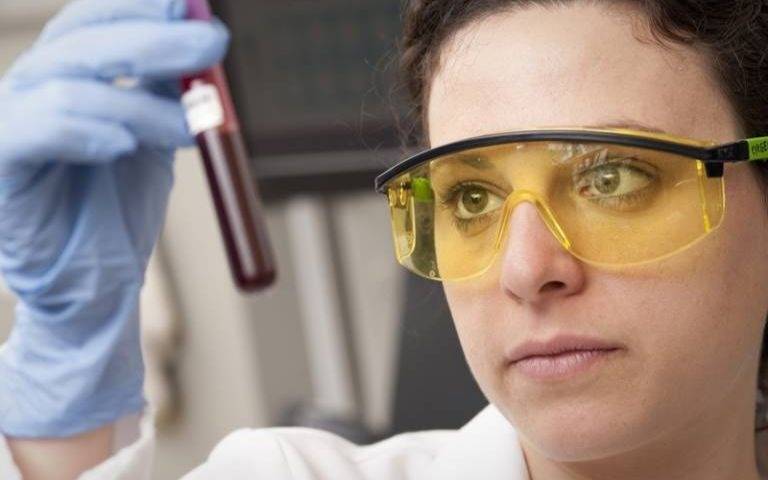Mapping COVID-19 effects and treatments in patients’ blood
28 May 2020
A new coalition of more than 500 scientists from 18 countries, involving UCL, will share data on COVID-19 gleaned from the use of mass spectrometry techniques which examine people’s blood and other biomarkers.

Announced in The Lancet today, and coordinated from The University of Manchester, the COVID-19 MS Coalition is made up of many of the world’s leading mass spectrometry experts who will work together to look at the ways in which the novel coronavirus is present in patients’ blood and examine in detail how the virus is structured.
The aim is to refine testing approaches, stratify treatment options, determine isolation requirements and bring much needed speed into measurement aspects of novel therapeutic development programmes – for COVID-19 and future threats.
Mass spectrometry (MS) is able to measure molecules that change in a patient’s blood as the infection takes hold. It can be used to find out what they are, and how many of them there are.
These measurements provide precise and reproducible diagnostic data at the molecular level that can complement information from genomic studies.
The coalition partners are also looking for biomarkers that will determine how a given individual will respond to the virus. These allow hospital labs to predict the outcome of the disease and to target treatment accordingly. By finding the biological pathways that alter as the disease takes hold, and considering genetic risk factors, mass spectrometry will provide crucial evidence as to why people respond differently
Mass spectrometry will be also be able to help develop effective treatments by targeted studies that measure the decrease in these markers.
The researchers will also attempt to define the precise structure of the viral spike protein and other antigens. Mass spectrometry is the only method that can map the complex sugar network that coats the surface of the viral spike protein and the human receptor. Coalition partners are working to see which parts of the virus are involved in the interaction with cells, and how this interaction allows the virus to open and drop the infective RNA into the human host. This detailed mapping of the interaction is vital in the development of vaccines, designed to be a weaker form of the virus.
Professor Kostas Thalassinos, academic lead of the UCL Mass Spectrometry Science Technology Platform from the Institute of Structural & Molecular Biology at UCL, is one of the founding members of the Covid-19 Mass Spectrometry Coalition.
Professor Thalassinos and his team are leading on the data management, curation and mining of the experimental data produced by the coalition, a critical part as mass spectrometry generates many different types of data, reporting on many aspects of the virus and its effect on human hosts. Curating the data and making it available in real time will allow mining of these data, and inform the ongoing work of many scientists and speed up our understanding of the disease.
Dr Kevin Mills, Head of the BRC Translational Mass Spectrometry Research Group at UCL Great Ormond Street Institute of Child Health and his team, are developing a mass spectrometry-based antibody test that is both more accurate and specific than current tests that are in use. If pilot studies are successful, they will be working with industry to develop an assay that can be rolled out to all national and international healthcare providers but will also be used in vaccine and medical intervention trials.
Professor Thalassinos commented: “My colleagues and I are proud to be supporting the scientific community’s global effort to fight COVID-19. UCL is playing a critical role with curating and analysing the diverse data sets that coalition members will generate. We hope that this project will help us understand more about this virus, how it works, and why some people are severely affected by it, but also in developing mass spectrometry methods for testing purposes.”
Professor Perdita Barran, Director of the Michael Barber Centre for Collaborative Mass Spectrometry, at The University of Manchester, was inspired along with her colleague Professor Clare Mills to develop the coalition, when her labs were closed during March.
Professor Barran said: “By cooperating in this way, the scientists working in the coalition will have access to many more sources of data from around the world. We will be pooling our expertise and we believe we will be able to work much faster and have an impact on a range of priorities; from testing, to treatment and vaccination.”
Links
- The COVID-19 MS Coalition
- Correspondence in The Lancet
- Professor Kostas Thalassinos’s academic profile
- Dr Kevin Mills’ academic profile
- Institute of Structural & Molecular Biology at UCL
- UCL Biosciences
- UCL Great Ormond Street Institute of Child Health
Image
- Source: National Eye Institute on Flickr (CC BY 2.0)
Media contact
Chris Lane
Tel: +44 (0)20 7679 9222
Email: chris.lane [at] ucl.ac.uk
 Close
Close

